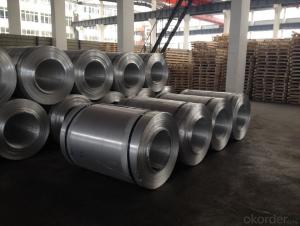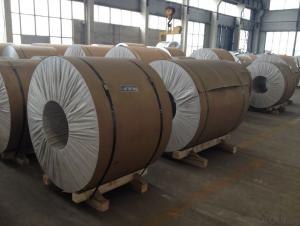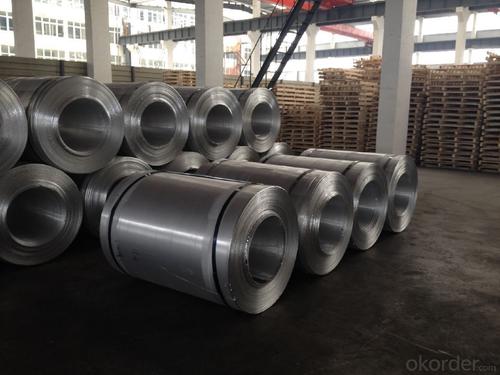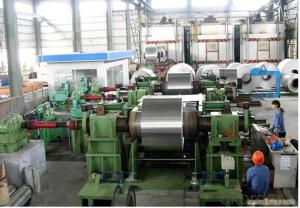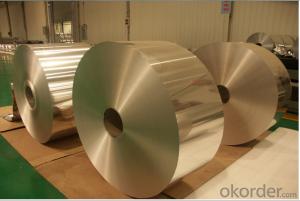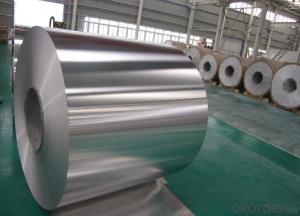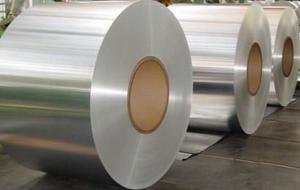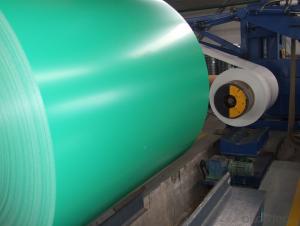5182 Aluminum Coils - Remelting Aluminium Coil Temper 1070 with Good Quality
- Loading Port:
- China main port
- Payment Terms:
- TT OR LC
- Min Order Qty:
- 500 m.t.
- Supply Capability:
- 1000 m.t./month
OKorder Service Pledge
OKorder Financial Service
You Might Also Like
Specification
Description of Aluminium Coil
Main equipments such as including uncoiler, rough tension-leveling machine, circle shear, oil washing equipment, refined tension-leveling machine, can realize integration process. The manufacturing and processing ranges are 4-16 mm * 850-1800 mm * 600-8000 mm, wich can satisfied with most of market demands of aluminium coil.
Alloy | Thickness(mm) | Width(mm) | Length(mm) | Temper | ||
1050,1060,1070,1100, 1235 | 0.2-3.0 | 300-1850 | 1000-8000 | O,H12,H22,H14,H24,H16,H26,H18,H32 | ||
3.0-150 | 900-1900 | H112,H111 | ||||
3003,3004,3105,3005 | 0.2-3.0 | 300-1850 | 1000-8000 | O,H12,H22,H14,H24,H16,H26,H18,H32 | ||
3.0-150 | 900-1900 | H112,H111 | ||||
5052,5083,5754,5005 | 0.2-3.0 | 300-1850 | 1000-8000 | O,H12,H22,H14,H24,H16,H26,H18,H32,H36 | ||
3.0-150 | 900-1900 | H112, H111 | ||||
6061,6063 | 0.5-3.0 | 300-1500 | 1000-6000 | T6,T321 | ||
The Main Features of Aluminium Coil:
High quality with competive prices.
Wide product range of choice.
We are specific manufacture and control.
The Images of Aluminium Coil:
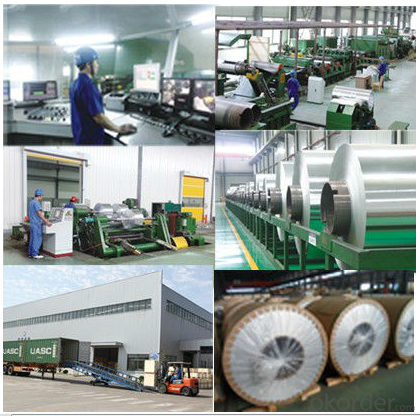
FAQ:
1. Minimum Order Quantity? MOQ is 25 tons, your quantity is ok, the aluminium foil sample is available. |
2. What kind of terms of payment? T/T, L/C,D/A,D/P,Western Union are available. |
3. What grams of the product can you offer? Our products can be customized according to your requirment |
4.Can you do Customization & Reproduction if I provide a photo? Yes, we do Customization & Reproduction service, please check the details and sample above. You need to send the pictures to our email, tell us the specification you want, then we will quote you exact price. We will take photos for you check. |
5. Does the packaging safe and arrive in good conditions? Yes, Safe Packing guarrantee, all the products will arrive your door under good conditions. We response to problem of shipping if there unfortunately is. |
6. How long does it usually take to deliver the product? We'll make the shipment to you immediately. It will take about 18 to 40 days arrive worldwide. Accurate delivery time depends on the specific quantity |
7.Is drop shipping abailable? Yes, it is, we can send to worldwide. |
- Q: What should pay attention to transporting aluminum coil?
- You must ensure the good property of the aluminum coil.
- Q: What are the steps to properly store an unused aluminum coil to prevent it from rusting?
- <p>To store an unused aluminum coil and prevent rusting, follow these steps: 1. Clean the coil thoroughly to remove any dirt or moisture. 2. Apply a thin layer of a rust inhibitor or light oil to the surface. 3. Wrap the coil in a protective plastic or wax paper to prevent moisture and air exposure. 4. Store the coil in a cool, dry place away from direct sunlight and humidity. 5. Ensure the storage area is well-ventilated to prevent condensation. 6. Periodically check the coil for any signs of rust and clean if necessary. By following these steps, you can effectively prevent rusting and maintain the quality of the aluminum coil.</p>
- Q: How are aluminum coils processed for specific thicknesses?
- To achieve specific thicknesses, aluminum coils undergo a series of manufacturing steps. The journey begins by casting molten aluminum into large ingots. These ingots are then transformed into thin sheets through the use of a hot rolling mill. To reach the desired thickness, the first step is hot rolling. The aluminum sheet is gradually reduced in thickness as it passes through a sequence of heated rollers. This process is repeated several times, with reheating occurring between each pass. Through hot rolling, the sheet is elongated and made thinner. Following hot rolling, the sheet may undergo cold rolling. This involves passing the previously hot rolled sheet through a set of cold rollers. Cold rolling further decreases the thickness and enhances the surface finish of the aluminum. It also enhances the material's strength and hardness. After this, the sheet is annealed. This entails heating it to a specific temperature and then allowing it to cool gradually. Annealing serves to relieve any internal stresses and enhance the overall ductility of the aluminum. Once the desired thickness is achieved, the aluminum sheet is typically cut into coils using a slitting machine. These coils can then undergo further processing or be utilized in various applications, such as the manufacturing of automotive parts, packaging materials, or building construction. In summary, the process of producing aluminum coils with specific thicknesses involves hot rolling, cold rolling, annealing, and slitting. These steps ensure that the aluminum sheet meets the required thickness specifications and is ready for further use in diverse industries.
- Q: why do we use copper more than aluminum? give some characteristic of copper that makes it better then aluminum?
- Copper is: -harder to oxidize -more ductile -better conductor of electricity -has a longer 'lifespan'
- Q: What are the different color options for pre-painted aluminum coils?
- The different color options for pre-painted aluminum coils are extensive and can include a wide range of shades such as white, black, gray, blue, red, green, yellow, and many more. The options are virtually limitless, allowing for customization and versatility in various applications.
- Q: My favorite deodorant contains aluminum. It smells really good and it works really well.My mom doesn't like me using it because it contains aluminum.So I got aluminum free. It doesn't smell at all (I can't seem to find fragrant aluminum free deodorant) and it doesn't work as well, for some reason.I want to keep using the one with aluminum, but will it be harmful to me in the future?
- all of my deodorants have aluminum in them. practically every deodorant that works out there has aluminum in it. the only one i know of that DOESN'T have aluminum is Tom's Natural and it doesn't work at ALL. See the aluminum is the key ingredient that stops you from sweating and stops odor, that's why it works so much better than your new aluminum-free one. But then again, use it wisely, because it's linked to alzeimer's, brain cancer, etc.
- Q: This question asks about the impact of aluminum coils on the quality of food when it is stored. It seeks to understand if there are any changes in the food's properties due to the presence of aluminum coils.
- <p>Aluminum coils themselves do not directly affect the quality of food during storage. They are often used in the packaging industry for their excellent barrier properties against light, oxygen, and moisture, which can help preserve the freshness and quality of food by preventing spoilage and oxidation. However, it's important to note that aluminum does not interact with food in a way that alters its taste or nutritional content. Any potential health concerns related to aluminum exposure are more associated with the manufacturing process and not with the storage of food in aluminum-coiled packaging.</p>
- Q: What are the methods to prevent rust formation on steel coils during storage and transportation?
- <p>To prevent rust on steel coils during storage and transportation, follow these steps: 1. Keep the coils dry and avoid exposure to moisture. 2. Use rust inhibitors or anti-corrosion coatings on the coils. 3. Store the coils in a clean, dry, and well-ventilated area. 4. Use protective wrapping materials like plastic film or corrosion-resistant paper. 5. Ensure proper stacking and avoid direct contact between coils. 6. Use rust-resistant materials for transportation containers. 7. Regularly inspect the coils for signs of rust and address any issues promptly. By implementing these measures, you can significantly reduce the risk of rust formation on steel coils.</p>
- Q: I HEARD THAT ALUMINUM POWDER TIGHTEN YOUR VAGINA BUT WHERE DO I BUY IT AND HAVE ANY ONE HEARD OF BEYDARY PILLS, I HEARD THEY TIGHTEN YOUR VAGINA ALSO AND WHERE CAN I BUY THEM
- try leaving it alone for awhile
- Q: I did a activity series lab and on my data table, it shows that lead reacted more than aluminum did, but aluminum is more active than lead. So, why does it show that lead is more active when it really isn't? Is it human error?
- Aluminum is more active than lead. You should double check your activity data table. If you confirm that the table says that lead is more active than aluminum, the table is in error.
Send your message to us
5182 Aluminum Coils - Remelting Aluminium Coil Temper 1070 with Good Quality
- Loading Port:
- China main port
- Payment Terms:
- TT OR LC
- Min Order Qty:
- 500 m.t.
- Supply Capability:
- 1000 m.t./month
OKorder Service Pledge
OKorder Financial Service
Similar products
Hot products
Hot Searches
Related keywords
